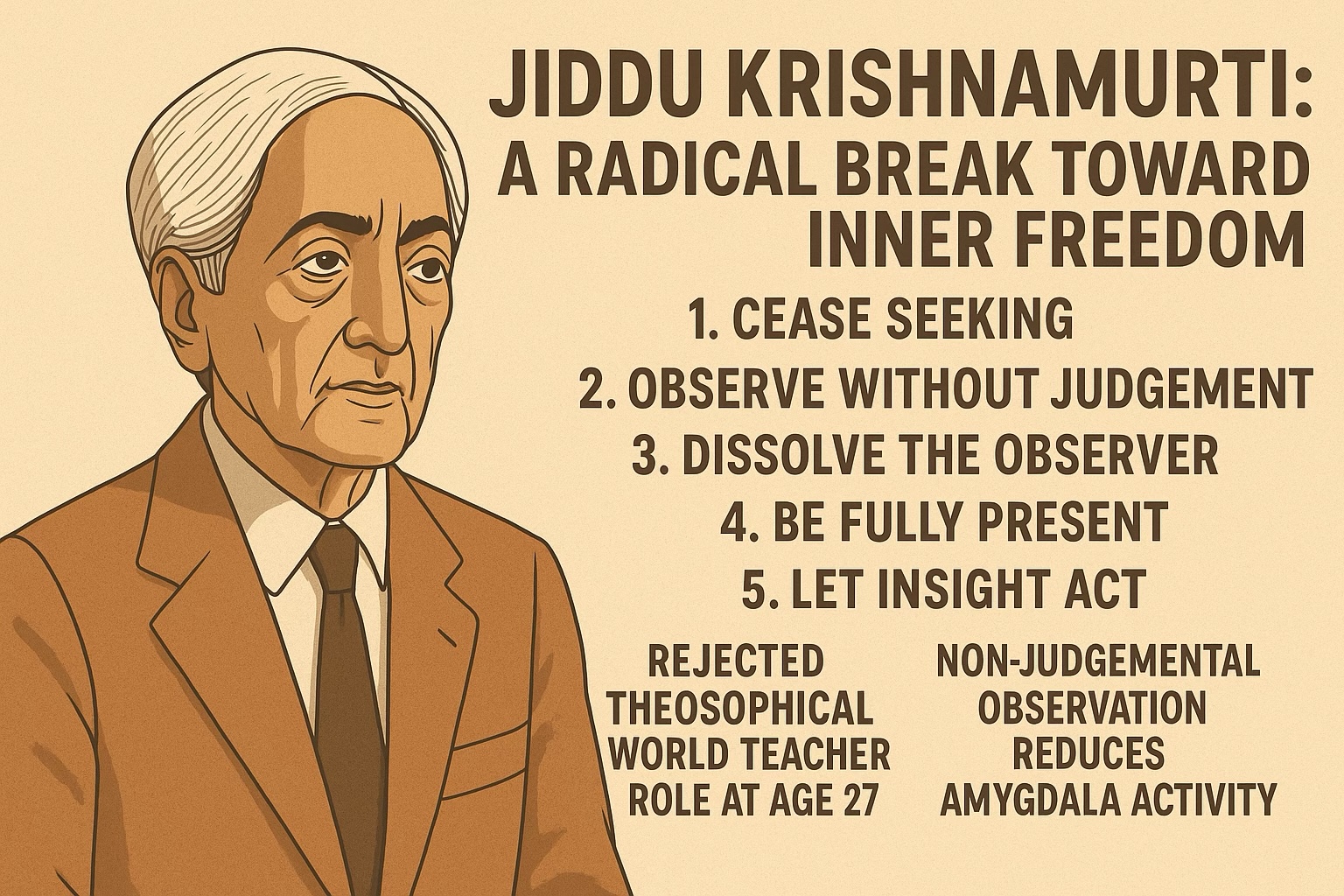In 1929, at just 27 years old, Jiddu Krishnamurti made a decision that stunned the global spiritual community. After being groomed from age 14 by the Theosophical Society to become the “World Teacher”—a messianic figure expected to lead humanity into a new spiritual era—Krishnamurti publicly dissolved the organisation formed around him, the Order of the Star. In doing so, he rejected both the role and the entire framework of spiritual authority, declaring, “Truth is a pathless land.” This bold move, documented in a 1997 ResearchGate study on his influence, marked a seismic shift from institutionalised spirituality to a self-directed journey of psychological freedom.
A Revolutionary Path: Krishnamurti’s Five-Step Approach
At the heart of Krishnamurti’s teachings is a method that prioritises direct experience and inner observation over doctrine or belief. His informal five-step approach can be summarised as:
- Cease Seeking: Let go of external spiritual authorities or systems.
- Observe Without Judgement: See thoughts, emotions, and behaviours clearly, without trying to change them.
- Dissolve the Observer: Recognise that the observer is the observed—there is no separate self watching the mind.
- Be Fully Present: Encounter life without the filters of past conditioning or future anxiety.
- Let Insight Act: Let understanding itself bring change, rather than willpower or effort.
These steps, particularly the emphasis on non-judgemental awareness, have found surprising validation in modern neuroscience. A 2013 study in Frontiers in Psychology showed that non-judgemental observation reduces activity in the amygdala, the brain’s fear and stress centre. This supports Krishnamurti’s long-standing claim that true psychological freedom arises not through struggle, but through awareness itself.
Influence on Aldous Huxley: From Dialogue to Fiction
Krishnamurti’s intellectual and personal friendship with Aldous Huxley during their shared years in WWII-era California was a fertile exchange of ideas. Huxley, already a public intellectual known for Brave New World, became deeply influenced by Krishnamurti’s insistence on self-understanding over guru-following. These ideas resonate powerfully in Huxley’s utopian novel Island (1962), which describes a society built on mindfulness, psychological insight, and freedom from dogma.
As detailed in the Journal of the Krishnamurti Schools, this cross-pollination between Huxley and Krishnamurti challenged conventional spiritual hierarchies. Instead of promoting enlightenment through external saviours or systems, both thinkers championed inner transformation through attention, dialogue, and observation.
Conclusion: A Legacy Rooted in Liberation
Jiddu Krishnamurti’s 1929 rejection of the spiritual spotlight was not a retreat, but a radical declaration of independence from belief systems and institutions. His teachings—grounded in self-awareness, observation, and direct experience—have not only stood the test of time but have increasingly found resonance with findings in psychology and neuroscience.
By walking away from the role of “World Teacher,” Krishnamurti ironically became a teacher for the world—one who continues to inspire individuals to look within, to question deeply, and to awaken without authority.
Sources: ResearchGate (1997), Frontiers in Psychology (2013), Journal of the Krishnamurti Schools, Island by Aldous Huxley (1962)*.

Leave a Reply